God Uses Children to Make an Eternal Impact
Jesus Knows Me
You’ve met Rafonzel once before. In the photo at the end of Eric’s post about the Leadership Development Program.* But photos are so last year. 🙂
Watch this short video (just under 10 minutes) and you’ll hear Rafonzel talk about the meaning of Compassion’s programs in her life – like Michelle did – and you’ll see Rafonzel meet her sponsor for the very first time – like Esther described for us yesterday.
*This content honors our historical Leadership Development Program. To learn more about our current youth development opportunities, click here.
Continue Reading ›
A Sponsorship Story for Ordinary People
We are the Brasile family from Hamden, Connecticut: Thomas and Esther. We have two daughters, Larissa and Leah. We believe in the ministry of Compassion International. This story is written by Esther.
Michelle Tolentino
Leadership Development Program graduate Michelle Tolentino talks about the value and meaning of Compassion’s programs in her life.
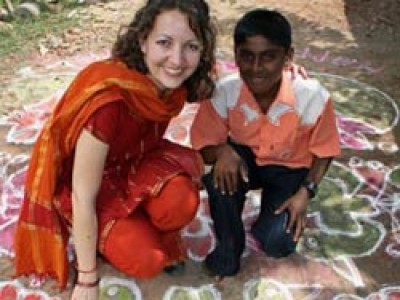
Meeting Sarath
NOTE FROM EDITOR: This content honors Compassion’s historical work in India. While we no longer have an India sponsorship program, we are grateful for the lives changed and meaningful work achieved through our sponsors and donors in our nearly 50 years there. For a detailed explanation of the end of our sponsorship program in India, please visit: compassion.com/india-update.
When I was in India last month, I met the boy I sponsor, Sarath. I had been hoping and praying to meet him, and I just happened to be taking a work trip to India.
I was a bit nervous. Don’t tell, but I’m not great with kids. I know I work at Compassion, but I’m a writer–more natural with a keyboard than with real, live people, let alone children who can smell fear. So I wasn’t sure how this was going to go.
The day I visited his village outside Chennai was Pongal, a festival in the state of Tamil Nadu. Along the way, we saw bright sand drawings outside every doorway and cows adorned with flower garlands for the holiday. I had put on my nicest salwar kameez, vainly worrying he would think I was some weird-looking old white lady.
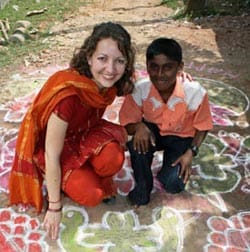
We arrived in Sarath’s neighbhorhood, and I was so happy to see that it was a relatively nice, pleasant place. There was space between the homes, his family had their own bathroom and even a little courtyard to play in and wash dishes.
Sarath was waiting outside. I’d like to say we rushed toward each other and hugged and cried. We didn’t. (I learned on my trip that Indian children don’t seem to be as into hugging as other cultures are.)
We shook hands and he whispered something in my ear. He was very sweet. He was so shy that during the entirety of my visit, he only whispered a couple of short phrases in my ear, so quietly I couldn’t tell if they were in English or Tamil.
We stepped inside and I met his mother, two lovely sisters, aunt, and cousin, who all share the same little room for their home.
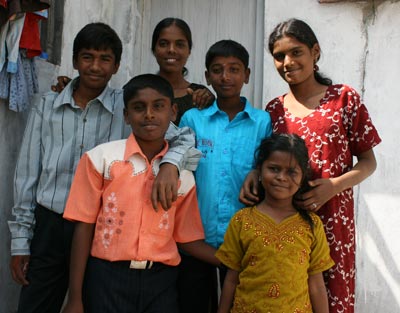
On their shelf was a picture of my husband and I. His mother told me that he likes to call us “Mommy” and “Daddy,” even though the project taught him to call us Auntie and Uncle. Sarath tells his mom that even if she dies, he knows he’ll be OK because there’s someone else who cares about him. (more…)
Slumdog Millionaire and Poverty Tourism
Last weekend I saw the movie Slumdog Millionaire. Have you heard of it? If you haven’t by now, you surely will soon. Just this week it was nominated for several Oscars, including Best Picture. (By the way, in case you were wondering, I think it should win Best Picture.)
Slumdog Millionaire tells the story of Jamal Malik, an orphan from the Mumbai slum who gets a chance to compete on India’s version of TV’s Who Wants to Be a Millionaire? (For those of you who are worried about a spoiler, don’t be. In the opening scene you find out that he makes it to the final question.)
Of course he is accused of cheating, as everyone assumes there is no way that someone from the slum could know the answers to so many trivia questions. The movie shows Jamal’s life in a series of flashbacks based on the game show questions, and explains how he knew the answer to each question.
It’s a fascinating concept for a movie. Thought-provoking, funny and often heart-wrenching, it is superbly executed.
Anyway, going into the movie, I had a rough idea of what it was about: a young man from the slums of India. Based on that, I figured that there would be a certain amount of poverty-related imagery. What I didn’t expect, though, was how deeply I was affected by the slum scenes.
Scenes of Jamal’s life reveal abuse, prostitution, drugs, violence … all the circumstances that typically characterize a life in poverty. Though it was a necessary part of the story and none of it was gratuitous, at times it was difficult to watch.
I found myself wondering what others in the theater were thinking. Was this the first time that some people in the theater have seen poverty like that? Did they realize they were seeing reality or did they think it was “Hollywood-ized”? Were they as profoundly affected as I was?
Then today a friend sent me this article about slum tours in India. Apparently the success of the movie has led to an increased interest in the “slum tourism” business in India. People see the movie and then want to see the “real thing.” The article contrasts the movie to the real-life slum tour:
While the show offers Jamal a route out of the gutter, the tour makes a beeline for the squalor from which his real-life equivalents strive to escape: the excursion’s “highlights” include a stop at a stall of six toilets that serves 16,000 people and a stroll alongside a river so black and septic that it oozes rather than flows.
I mean, really?? Ridiculously overcrowded toilet facilities are an “attraction”? I have a hard time accepting that people actually pay to see that.
For those of you who’ve been around here a while, you might remember our previous discussion about poverty tourism. This article showed me how conflicted I still am about this idea.
On the one hand, I think these poverty tourists are despicable for engaging in this overt exploitation of other people’s suffering. On the other hand, they are getting a close-up, powerful (and hopefully life-changing) view of poverty that few get the chance to experience.
So here is a question for you to ponder …
In the case of poverty tourism, does the end justify the means?
In other words, is it worth exploiting the poor in their helpless, and often hopeless, situation if it ultimately changes someone’s heart towards the poor?
I’d really like to hear your thoughts on this one.
Christian Warrior
Photos by Ratchana Suksabye.
It was night at the Chiang Mai 700 Year Stadium, and the quiet evening was disrupted by a loud voice coming from the tae kwon do gym.

The spokesman announced the names of the new northern region competitors for the final round of Her Royal Highness Princess Maha Chakri Sirindhorn’s cup.
There were many people shouting and cheering in celebration of the finalists who had been announced. Amidst the storm of voices, finalist Siriporn stood still.
She did not hear a single word from the crowd, but was focused on her whisper to God. She silently prayed, “May this competition glorify your Name.”
As she opened her eyes, she was ready for the last battle in the spotlight.
Siriporn is a young girl from Thai Chareuntham Child Development Center, located in the rural area of northern Thailand. While she walked onto the floor, all she was thinking about was that the day she had been waiting and training for had arrived. (more…)
Tsunami Disaster Relief in Indonesia
Four years ago, on December 26, 2004, one of the deadliest natural disasters in history hit Indonesia, Sri Lanka, India, and Thailand. More than 225,000 people were killed in 11 countries.
Banda Aceh was one of those communities devastated by the tsunami. We had no active program in Banda Aceh before the tsunami, and in fact, none of the areas where we worked in Indonesia before the tsunami were affected.
But when the tsunami hit, we initiated temporary relief work under the name ‘ARIEF’ or Aceh Relief for the tsunami victims. This local name was chosen in order to allow a local ministry to take over the relief and do follow-up work for the beneficiaries of the programs after our initial relief work ended. Our relief work was initially planned for one year. (more…)
New Year’s Resolutions
I’m not much into New Year’s resolutions. I find it an odd tradition. If you really want to change your life, why wait until January 1 to start? But perhaps it’s a positive thing if it helps us to truly focus on being better human beings — even if our New Year’s resolutions only last a few days or weeks!
Take a look at some of these popular New Year’s resolutions for 2009:
- In 2009, I resolve to eat better.
- In 2009, I resolve to keep my home in better shape.
- In 2009, I resolve to take better care of my body.
- In 2009, I resolve to be better about what I spend my money on.
- In 2009, I resolve to look for a new job.
Any of those look familiar?
Now, go back and read those resolutions again … but this time, from the perspective of a person living in poverty.
Imagine a little boy in Kenya who resolves to eat better because he’s tired of going to bed hungry. Imagine a single mother in Peru who resolves to keep her 6’x6’ shack clean. I’ve seen families that sweep their dirt floors just to try to keep their humble homes presentable.
Imagine a little girl in India who wants to take control of her own body instead of falling prey to the men who abuse it. Imagine the family that scrapes together spare change to eat today. Imagine the father who is desperately searching for a job so he can give his children an education and a shot at life.
This year, I urge you to resolve to do something about global poverty. Get involved.
Here’s a list of suggested, revised New Year’s resolutions for you:
- In 2009, I resolve to go on a mission trip.
- In 2009, I resolve to help my church start a food pantry — or donate to an existing one on a regular basis.
- In 2009, I resolve to pray for children trapped in poverty.
- In 2009, I resolve to support a ministry that cares for the poor.
- In 2009, I resolve to think beyond myself and truly make a difference in the life of a child living in poverty.
And let’s try to make these New Year’s resolutions last.
Presents for the King
The church was packed with 200 children and their parents, celebrating the pre-Christmas program with the Compassion child cevelopment center. When the host announced the opening of the program, the room burst with clapping.
Laboni was there with her sister Sraboni. Everything around Laboni was entirely new for her. She belongs to a Christian family, but in their lives Christmas is just like every other regular day. There has been nothing very special about Christmas except going to church in the morning.
But after Laboni and her sister got registered at the child development center, everything around her has been changing in a positive way. The meaning of Christmas has also changed.
Yellow Leaf Spirits
In the high mountains of Northern Thailand lives an extraordinary tribe who have no written history and whose way of life is disappearing with the forests.
They knew only how to survive in the deep jungle, building homes from fresh banana leaves. They would sleep on the leaves and use them as a roof to protect from the rain and dew at night.
If they could not find food in the area nearby, they would move on deeper into the forest. They would wander in the forest, staying together in small groups. Education, a house, and clothing were of no value to them, as they had no use for these things living in the forest.
The isolated tribe was also afraid of strangers. If they met any outsiders, they moved away immediately, like spirits. They lived like this for centuries, the last nomadic tribe to survive in the northern forests of Thailand and Laos. (more…)
Kamrul Receives His Cycle Van
Kamrul received the cycle van you bought him! He received it eight days ago.
It was another hot afternoon at Suagram, and Mukta ran to her grandmother’s house. “Granny! Granny! Come out.”
An elderly woman came out; Mukta said loudly, “I am going to have a cycle van tomorrow. Now my father will drive my own cycle van.”
Her grandmother asked, “Who is giving you a cycle van?”
The 8-year-old girl replied proudly, “My Compassion center!”
The next day was very special for Mukta, her father, Kamrul, and their family. They were going to have a brand new van, as a gift from Compassion sponsors who read the U.S. blog.
Kamrul and his family dreamed about having their own cycle van for years. Although they considered Compassion as the great opportunity for their daughter’s development, they never thought that their dream of a cycle van could come true through the Compassion center. However God had a different plan for this family, and He used Compassion to bring blessings to them.
I reached Suagram Child Development Center at 8 a.m. Kamrul was there, waiting for me. He grabbed my hand and said, “Thank you so much, for what you did for us.”
I replied, “Don’t thank me. Thank Almighty God for his grace and thank the sponsors who made it possible.”
Kamrul said again, “I praised God thousands of times. Me and my family prayed for the sponsors and their families, that they could live a long, healthy and happy life.”
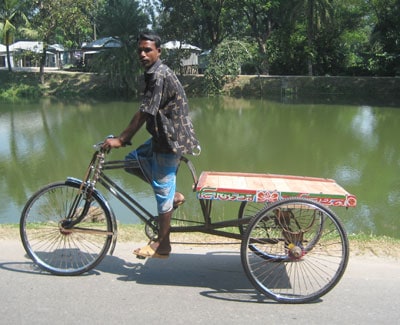
We went to the marketplace called “Ghaghar” to buy the cycle van. The child development center manager was also with us; he ordered the van the previous week. It was a nicely built cycle van.
The center manager was checking the cycle van, but I was observing the reaction on Kamrul’s face. There was a deep satisfaction and peace.
The center manager paid the bill and asked Kamrul, “Are you happy?”
He answered, “I couldn’t wish for more. This van will change the condition of my family.”
Kamrul took us on his new cycle van as his first passengers. He was driving faster than the previous time I rode his van. I thought there might be two reasons. The new cycle van was excellently made, and at that time Kamrul was the happiest man on the earth and wanted to fly.
We reached his house and paid him. Kamrul strongly refused to take money from me, but I was able to make him understand that he should take it as his first income from the van.
At his house, Mukta was waiting for us. As soon as Kamrul parked the van, little Mukta hopped on the van. She stood on the van and silently made us believe that it was her van.
Kamrul and his wife Rehana were getting busy to entertain us. The center manager tried to stop them, but Kamrul answered, “We couldn’t be able to give a treat to our beloved sponsors. So please let us entertain you with coconut water on behalf of the sponsors.”
Coconut water is a special drink in the rural areas; only special guests are entertained with coconut water. Kamrul and Rehana prepared and served coconut water to us. It was one of the sweetest and most refreshing drinks I have ever had.
Kamrul, Rehana, Mukta and little Sihab (Mukta’s younger brother) were sitting in front of us, and we were talking outside their house. A few neighbors also joined us.
I described to Kamrul and family about how our respected sponsors provided them the van. Kamrul shared his feelings:
“I am so pleased and amazed by the greatness of the Compassion sponsors. I struggled a lot with my family. Not even my own brother and sisters took care of us, but these people from thousands of miles away are thinking of our benefits.
This is amazing!
Now I can earn my own living and don’t have to pay the van owner daily. If I can work everyday then I won’t have any problem to maintain my family. At least I can buy food everyday for my children.
Please thank the sponsors on behalf of me and my family. Also tell them that their love is blessings for my family.
May God bless them and their children everyday!”
Rehana said, “Now my husband can work more freely. Hopefully we would overcome our difficult periods. Thanks to all the Compassion people and staff who made it possible for us. They think about us more than our own relatives.”
Mukta was having fun on the van. She said, “This is my van, and I will let my father drive it.”
Kamrul was laughing and replied, “Yes dear, it is your van.”
Mukta thanked all the sponsors in her own words and said in Bengali, “Amake van kine debar jonno tomader sobaike onek onek dhonnobad.” It means, “Many thanks to all of you for buying me this cycle van.”
Kamrul took his whole family on the van and had a fun drive. Later he picked up Mukta from the project on his van and took her home.
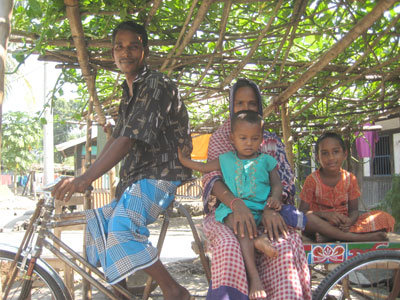
The gift amount was 10,200 Bangladeshi taka. The cycle van cost 9000 taka, and with the remaining 1,200 taka, the Compassion center bought a new pair of shoes for Mukta, a mosquito net, and two pillows for Kamrul’s family — things Kamrul and Mukta asked for.
It was a big day for this family. The satisfaction on Kamrul and Mukta’s face reminded me of the Grace of our heavenly Father.
Special thanks to all the sponsors who considered Kamrul as their own brother and Mukta as their own niece.
Today’s post is a followup to the August 7, 2008 post, A Day in the Life of a Bangladeshi Cycle Van Driver.


